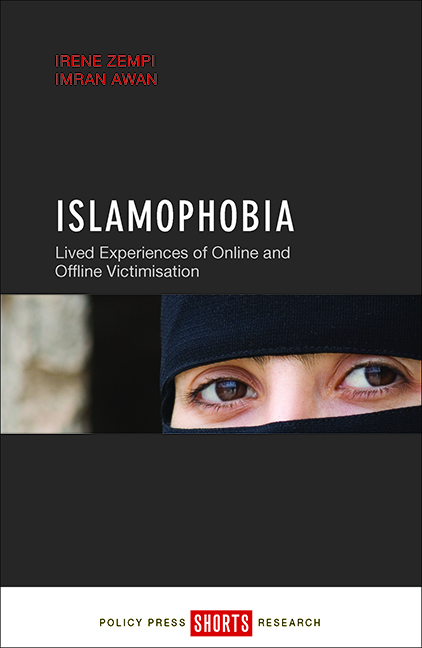Book contents
three - Triggers of Islamophobic violence
Published online by Cambridge University Press: 05 April 2022
Summary
This chapter examines the factors that determine the prevalence and severity of Islamophobic violence such as ‘trigger’ events of local, national and international significance. Correspondingly, the study participants reported that the prevalence of both online and offline Islamophobic hate crimes increased following recent high-profile terrorist attacks around the world such as Sydney, Paris, Copenhagen and Tunisia. Additionally, national scandals such as the grooming of young girls in Rotherham by groups of Pakistani men and the alleged ‘Trojan Horse’ scandal in Birmingham, framed as a ‘jihadist plot’ to take over schools, were also highlighted as ‘trigger’ events. The ‘visibility’ and intersectionality of victims’ identities also emerged as contributing factors to manifestations of Islamophobia, both online and offline.
Terrorist acts – national and international
Recent research shows that the prevalence and severity of Islamophobic hate crimes are influenced in the short term by singular, or clusters of, events. From this perspective, Islamophobic hate crimes increase following ‘trigger’ events as they operate to galvanise tensions and sentiments against the suspected perpetrators and groups associated with them. Specifically, terrorist acts appear to function as antecedent ‘trigger’ events that ‘validate’ prejudicial sentiments and tensions, thereby promoting the spread of hostile beliefs and the mobilisation of action as a result of the desire for retribution in the targeted group (Williams and Burnap, 2015). This manifests in the escalation of hostility towards groups that share similar characteristics to the perpetrators.
Indeed, evidence demonstrates that Islamophobic hate crimes have increased significantly following ‘trigger’ terrorist attacks carried out by individuals who choose to identify themselves as being Muslim or acting in the name of Islam. King and Sutton (2014) found an association between the 9/11 terrorist attacks and a rise in hate crime incidents with a specific anti-Islamic motive in the US. In the UK, Hanes and Machin (2014) found significant increases in Islamophobic hate crimes reported to the police in London following 9/11 and 7/7. Both studies highlight a sharp de-escalation following the spike in Islamophobic hate crimes, which occurred as a result of the ‘trigger’ terrorist events. Spikes in Islamophobic hate crimes and incidents following ‘trigger’ terrorist events are not confined to the offline world; rather, the offline world pattern is replicated in the online world (Awan, 2014).
- Type
- Chapter
- Information
- IslamophobiaLived Experiences of Online and Offline Victimisation, pp. 25 - 42Publisher: Bristol University PressPrint publication year: 2016



